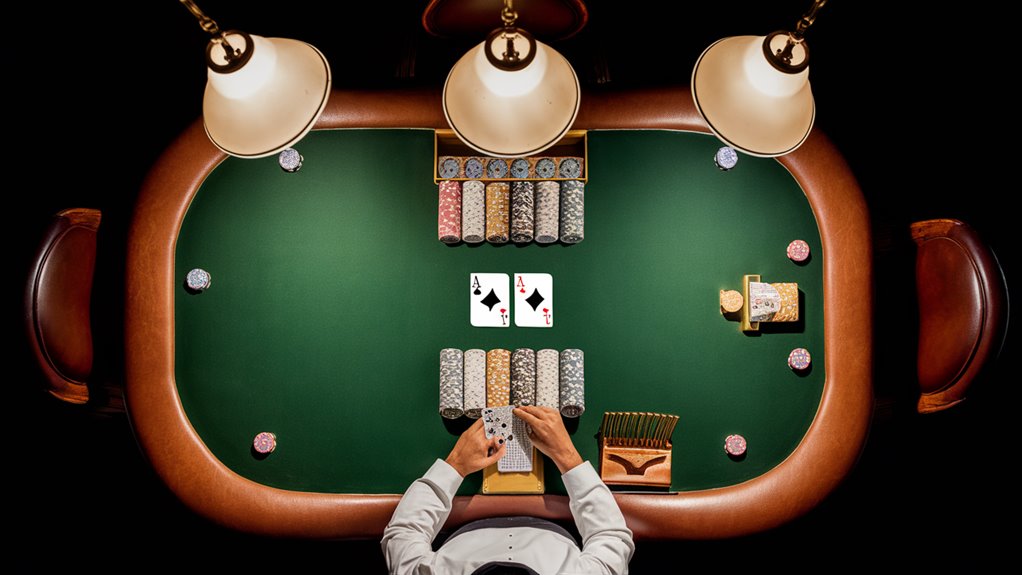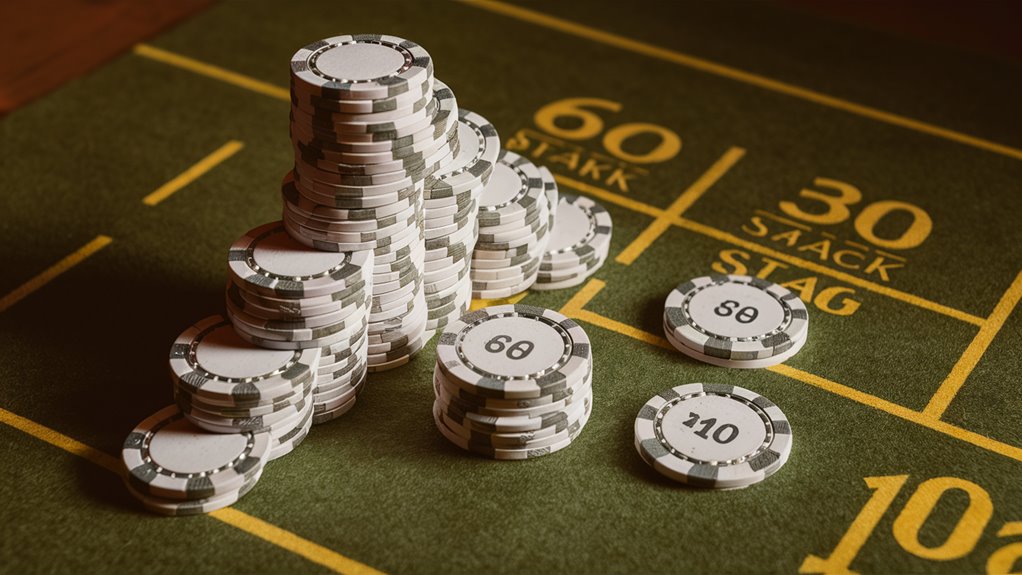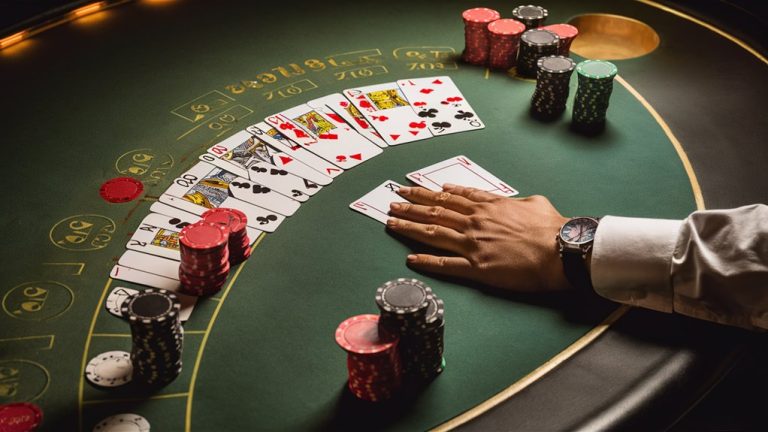
All About Poker: Learning the Basics

Main Poker Ideas
Poker is a game of cards and smart play. The goal is to make the best five-card set or win by wise betting. Knowing the main parts of poker helps you make a good game plan.
Order of Hands and Card Sets
The royal flush is the best hand in poker, having A-K-Q-J-10 in the same suit. Then, from high to low: four of a kind, full house, flush, straight, down to a single high card. Learn these to make fast choices.
Where to Sit Matters
Your seat at the table can change your odds. The best spot is the button, right next to the dealer. You need to change how you play if you sit in early, middle, or late positions.
More Complex Strategies
To do well, know pot odds, betting types, and how to read other players. These deeper ideas mix math and mind games, lifting your play from basic to top-notch. 이 사이트에서 자세히 보기
Betting Makes the Game
Smart betting keeps you ahead. Count your pot odds, see bets from others, and make the right move to call, raise, or fold depending on your spot and hand strength.
Mastering Hand Values
Full Breakdown of Poker Hand Values
Learning Hand Levels
The heart of poker is in the hand values, which pick who wins at the end. These values sort from top to low and guide all game choices.
Top Hand Values Explained
The Highs: Royal and Straight Flushes
The Royal Flush is best, with A-K-Q-J-10 of the same suit.
The Straight Flush comes next—five cards in a line, same suit. Insight to Outsmart the House
Strong Sets
A Four of a Kind is four the same cards.
A Full House mixes three and a pair, and a Flush has any five cards of one suit.
Mid-Level Values
A Straight is five cards in order.
Three of a Kind has three the same.
More Basic Sets
Two Pair means two different pairs.
A One Pair has two same cards.
The High Card is for hands without matches, set by the top card.
Quick Hand Spotting
Fast hand spotting is key to win. Sharp think and fast choices matter at crucial times.
Your Spot at the Table
Know Your Poker Table Spot: Why It Matters
Basics of Table Spots
Table spots shape a lot of your poker game, changing win chances. Your spot sets when you bet each turn, either adding edge or limits. Smart players use this to their gain.
Key Spots Broken Down
The Blinds
The small and big blinds start with a lower hand:
- Must bet first
- Less info to bet with
Early Spot
Those in early spots have to pick hands well:
- Few clues on others’ moves
- Might face more raises
- Need strong hands to stay in
Middle Spot
Middle spots bring more play room:
- Can see some early actions
- A mix of timid and bold plays works
Best Spots
The top seats are the cut-off and button:
- See most play before you act
- Good for taking blinds
- Can play more hands
- Better at controlling the pot
- Best for bold moves
Using Your Spot Right
Being on the button helps a lot:
- See all plays first
- Last to act later
- Helps play average hands well
- Big for bluffing
- Pot odds get easier
Different Poker Kinds
All About Popular Poker Styles
Main Poker Kinds and Basics
Poker has many styles, each with its own play style and tricks. Knowing these types is key for new and skilled players. for Rational Slots Play
Top Poker Styles
Texas Hold’em
This main style uses two private cards and five shared cards. Make the best hand from your or shared cards. It’s big in tournaments for its deep strategy.
Omaha Poker
This quick game gives each player four private cards, needing two plus three shared ones. Pot-Limit Omaha (PLO) is well-liked for big pots and tough choices.
Seven-Card Stud
An old style that deals seven cards to each through many bets. Starts with three cards, then four more, needing strong card reads.
Poker in Casinos
Caribbean Stud
You play against the house, not others. Uses five-card hands and simple plays, liked by many.
Three-Card Poker
A quick poker type using three cards with many betting choices.
Five-Card Draw
The old style deals five private cards; you can change cards to better your hand; great for learning.
Smart Playing Tips
Each type needs different skills. Knowing one style well before trying others helps you do better.
How Betting Works
How Poker Betting Works: Deep Dive

Types of Betting
Fixed-limit betting sets clear bet levels. It brings steady action with less up-and-down. Pot-limit betting lets you bet as much as the pot size. This makes for interesting plays and keeps risks in check. No-limit betting lets you bet all you have. It’s thrilling and can bring big wins but needs good risk skills.
How Betting Goes
Each hand starts with must-bet blinds. Then, players check, bet, call, raise, or fold in many betting rounds. Competitive Gambling
- Starting bet
- First raise
- Re-raise
- Cap (last raise)
Smart Betting Skills
Knowing betting well affects your success. Each kind needs different play styles, hand choices, and risk ideas. Smart players change their plays based on the bets, staying sharp in all situations.
Important Ideas:
- Your spot matters a lot
- Good risk-take balance
- Study how others bet
- Watch what hands others like
Reading Opponents
How to Read Other Players in Poker: Full Guide
How They Bet and Act
Knowing poker minds and reading others are key for good wins. Here, we look at top ways to see what others may do.
Looking at How They Bet
Watching how they bet helps guess their cards. Players who always bet a set way, like 75% of the pot, might be easier to read. How fast they play gives clues too. Quick plays might mean very good or very bad cards. Taking too long might show so-so cards.
Spotting Body Signs
Body moves can tell us a lot. Look for:
- Shaky hands or fast breaths
- How they handle chips—neat or messy
- Fast heartbeats or eye shifts
- How they sit—comfy or not
Knowing Your Rivals
Fully knowing your foes means watching many things:
- How they change by spot
- Remembering past hands
- Spotting their usual bets
- Reading their non-talk cues
This deep look helps make the best moves by using all you know.
Words to Know in Poker
Key Poker Words: The Basics
Main Table Spots
Knowing table words helps in playing smart. The under the gun spot acts first after blinds, while the button spots let the dealer play last, giving a big edge. These spots guide how you move each hand.
Cards and Betting
Your hole cards are your two hidden cards at the start. They set up your game plan. Community cards are for everyone. Using these with your cards decides hands. Good play needs knowing these links.
Key Moves
Words for moves include calling (matching a bet) and raising (upping the bet). Understanding pot odds – how the pot size compares to your bet – helps make smart math choices. Implied odds think about future bets, crucial when you play to draw cards.
Mindset and Strategy
Outs are cards that better your hand, while drawing hands need specific cards to finish strong. Spotting these chances helps make money moves. Staying calm and spotting others losing cool gives you edge. Play cool to use their mistakes.
Keeping Your Money Safe
How to Manage Your Poker Money: Tips for Long Runs
Keeping a Good Poker Fund
Smart money care keeps you in the game for the long run and makes you win more. Pros keep 20-30 times their bet to stay safe in ups and downs. For $1/$2 games, a good fund is around $4,000-$6,000.
Smart Playing Levels
Follow clear level rules to help your fund grow. Go up a level with 40 times your bet, and step back with fewer than 20 bets. Never risk more than 5% of your total money in one game.
Tracking Wins and Learning
Track your games with sheets or special software to see your win rates and swings. Set clear stop-loss levels. If you hit these, take a break and check your plan.
Keeping Poker Money Straight
Keep game money away from day-to-day money to stay honest. Good money care is not just about keeping money safe—it also keeps you sharp and ready at the table. Watching and tweaking your money plan ties right into long-term wins.



